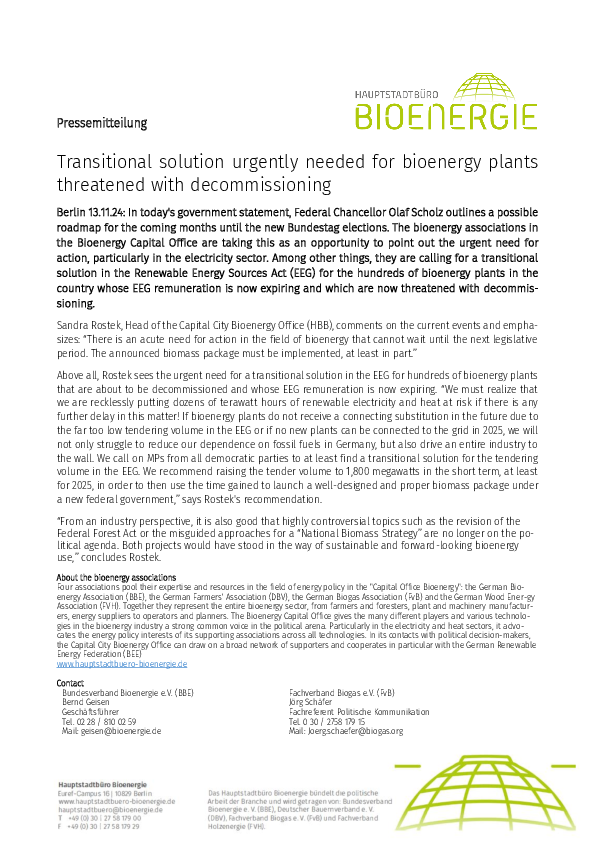Sandra Rostek, Head of the Capital City Bioenergy Office (HBB), comments on the current events and emphasizes: “There is an acute need for action in the field of bioenergy that cannot wait until the next legislative period. The announced biomass package must be implemented, at least in part.”
Above all, Rostek sees the urgent need for a transitional solution in the EEG for hundreds of bioenergy plants that are about to be decommissioned and whose EEG remuneration is now expiring. “We must realize that we are recklessly putting dozens of terawatt hours of renewable electricity and heat at risk if there is any further delay in this matter! If bioenergy plants do not receive a connecting substitution in the future due to the far too low tendering volume in the EEG or if no new plants can be connected to the grid in 2025, we will not only struggle to reduce our dependence on fossil fuels in Germany, but also drive an entire industry to the wall. We call on MPs from all democratic parties to at least find a transitional solution for the tendering volume in the EEG. We recommend raising the tender volume to 1,800 megawatts in the short term, at least for 2025, in order to then use the time gained to launch a well-designed and proper biomass package under a new federal government,” says Rostek's recommendation.
“From an industry perspective, it is also good that highly controversial topics such as the revision of the Federal Forest Act or the misguided approaches for a “National Biomass Strategy” are no longer on the political agenda. Both projects would have stood in the way of sustainable and forward-looking bioenergy use,” concludes Rostek.
About the bioenergy associations
Four associations pool their expertise and resources in the field of energy policy in the "Main Bureau Bioenergy": the German Bioenergy Association (BBE), the German Farmers' Association (DBV), the German Biogas Association (FvB) and the German Wood Energy Association (FVH). Together they represent the entire bioenergy sector, from farmers and foresters, plant and machinery manufacturers, energy suppliers to operators and planners. The Bioenergy Capital Office gives the many different players and various technologies in the bioenergy industry a strong common voice in the political arena. Particularly in the electricity and heat sectors, it advocates the energy policy interests of its supporting associations across all technologies. In its contacts with political decision-makers, the Capital City Bioenergy Office can draw on a broad network of supporters and cooperates in particular with the German Renewable Energy Federation (BEE)

